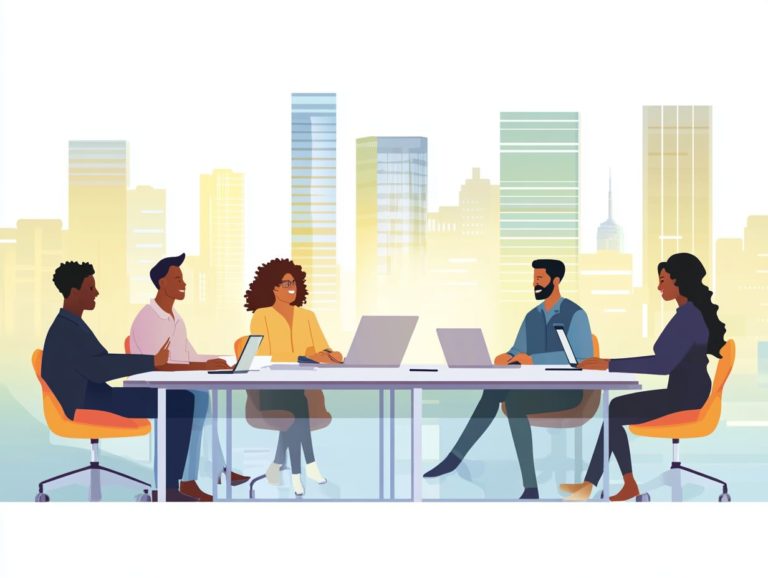Effective Communication Skills for Negotiators
Negotiation is more than reaching an agreement; it’s an important skill built on communication, trust, and understanding emotions.
As you navigate this world, you will learn essential skills like active listening and interpreting body language. Building rapport is key to creating a collaborative atmosphere, especially during tough discussions.
You will discover strategies for closing deals smoothly. Whether you’re a seasoned negotiator or just starting out, these insights will boost your skills.
Contents
- Key Takeaways:
- Effective Communication Skills for Negotiators
- Building Rapport and Trust
- Creating a Collaborative Environment
- Handling Tough Situations
- Managing Emotions
- Closing the Deal
- Frequently Asked Questions
- What are effective communication skills for negotiators?
- How can active listening improve communication in negotiations?
- Why is non-verbal communication important in negotiations?
- How can I use persuasive language in negotiations?
- What are some barriers to effective communication in negotiations?
- How can I improve my communication skills as a negotiator?
Key Takeaways:

Active listening is vital. It means engaging with the other party and showing you understand their perspective.
Body language matters too. It can show confidence and build trust. Pay attention to how someone speaks and reacts.
Trust is essential for success. Find common ground to create win-win solutions.
Defining Negotiation and Its Importance
Negotiation is a crucial skill that involves various communication strategies aimed at reaching agreements.
This skill is important in many situations, from politics to business and personal relationships.
It takes understanding your own needs while empathizing with others to solve problems effectively.
For example, think about leaders like Joe Biden and Donald Trump. They often negotiate under pressure, showing the power of negotiation in high-stakes situations.
In business, negotiation is equally important. As a leader, you need to navigate deals that clearly communicate benefits while addressing concerns.
Trade negotiations require balancing national goals with the needs of citizens.
In court, effective negotiation can lead to better outcomes for clients through plea bargaining, which means negotiating a deal for a lesser charge.
Successful negotiation hinges on clear communication and finding common ground. This not only improves results but also builds lasting relationships based on trust.
Effective Communication Skills for Negotiators
Strong communication skills are essential for negotiators. They enable understanding, persuasion, and teamwork in any negotiation, highlighting the role of confidence in effective negotiation.
To excel, practice active listening and be aware of nonverbal cues like body language. These skills enhance the negotiation process.
Active Listening
Active listening is key in negotiations. It helps you understand the other party’s needs and reduces misunderstandings.
By engaging fully in the conversation, you can provide feedback that promotes respect and collaboration.
Using techniques like summarizing what you’ve heard shows the other party that their concerns matter.
This practice leads to better problem-solving and open dialogue.
In conflict situations like business negotiations this approach can turn tension into constructive discussions, leading to innovative solutions.
Nonverbal Communication
Nonverbal communication holds tremendous importance in negotiation, often expressing more than mere words can through body language, facial expressions, and gestures.
By grasping the nuances of these nonverbal cues, you can cultivate trust and rapport, significantly enhancing your effectiveness in forging mutually beneficial agreements.
For example, when you maintain steady eye contact, it conveys confidence and sincerity, while avoiding direct gaze may signal discomfort or disinterest.
An open body posture typically reflects receptiveness, whereas crossed arms can create an invisible barrier, complicating successful dialogue.
Picture this: you lean in slightly, showing you’re engaged; this action may prompt the other party to respond with similar openness.
Recognizing these subtle yet impactful signals can profoundly influence the outcomes of negotiations, guiding discussions toward more fruitful conclusions.
Empathy and Understanding

Empathy and understanding are crucial traits for you as a negotiator. They allow you to connect with others on an emotional level and build teamwork while enhancing your chances of reaching a satisfactory agreement.
Demonstrating empathy helps you understand the interests and emotions of the opposing party, which paves the way for more effective communication and negotiation strategies.
This connection is tied to emotional intelligence, which means being aware of your own feelings and understanding others’ feelings too.
Take successful negotiators like Oprah Winfrey, for instance. She effectively employs empathy by actively listening to the concerns of others and acknowledging their feelings, creating a safe space for dialogue. Similarly, former U.S. President Barack Obama exemplifies empathetic negotiation, often bridging divides by showing genuine understanding.
This approach builds trust and encourages collaboration, ultimately leading to more favorable outcomes for everyone involved.
Building Rapport and Trust
Building rapport and trust is essential to mastering the art of negotiation. These elements foster an environment ripe for open communication and collaboration.
When you establish a positive relationship with the other party, negotiations flow more smoothly, paving the way for a spirit of cooperation that can yield more favorable outcomes.
Consider prominent figures in political realms, such as Amy Coney Barrett and Ruth Bader Ginsburg; they exemplified how crucial rapport is in their interactions within the Supreme Court. Their ability to connect with others underscores the significant impact of trust in achieving successful negotiations.
Establishing a Positive Relationship
Building a positive relationship is essential in negotiation. It lays the groundwork for trust and collaboration.
For instance, during the historic Camp David Accords, President Jimmy Carter worked hard to create a supportive atmosphere, encouraging open dialogue between Israeli Prime Minister Menachem Begin and Egyptian President Anwar Sadat.
By actively listening and respecting their different viewpoints, he built a relationship that paved the way for a historic agreement.
In the corporate world, leaders who prioritize relationship-building taking time to understand their counterparts’ needs and crafting thoughtful compromises often find these strategies yield more favorable results.
The long-term benefits of these techniques can extend beyond individual negotiations, cultivating partnerships that thrive over time.
Creating a Collaborative Environment
Creating a collaborative environment during negotiations is vital for fostering mutual gains and ensuring that everyone involved feels heard and valued. By encouraging open communication and demonstrating trust, you can cultivate a space where innovative solutions emerge, ultimately leading to successful negotiation outcomes.
In high-stakes negotiations, like those between countries over trade agreements, the importance of trust and mutual gains cannot be overstated. Take the Paris Agreement, for example. Countries came together, embracing the concept of collective action for the greater good while also attending to their individual needs. This approach fostered a strong sense of partnership and shared responsibility.
Companies often use collaborative strategies during mergers or acquisitions, prioritizing transparent dialogue to minimize resistance and promote a sense of shared victory. When negotiators prioritize a collaborative atmosphere, they not only enhance the likelihood of reaching beneficial agreements but also strengthen long-term relationships.
Handling Tough Situations
Handling tough situations well is a signature trait of skilled negotiators. It requires not just conflict resolution abilities but also effective emotional management strategies.
When confronted with tension or disagreement, successful negotiators employ techniques designed to cultivate cooperation and facilitate clear dialogue. This approach paves the way for productive resolutions that benefit all parties involved.
Dealing with Conflict

Dealing with conflict is an inevitable part of negotiation, requiring you to employ effective resolution strategies that can transform challenges into opportunities for collaboration.
As a proficient negotiator, you can utilize problem-solving techniques and clear communication to address conflicts, ensuring that all parties involved reach a satisfactory agreement.
Consider employing active listening during discussions. This skill can help you uncover underlying interests that may not be immediately visible, enabling you to craft solutions that satisfy everyone.
For instance, think about a labor union negotiating a new contract. By openly discussing the concerns of both workers and management, you can foster a more favorable environment for compromise. Mediation techniques can also be invaluable in this process.
Involving a neutral third party often leads to innovative solutions, as their external perspective encourages flexibility and creativity. These strategies not only assist in resolving specific disputes but also help build lasting relationships among all negotiating parties.
Managing Emotions
Managing your emotions effectively is essential in negotiation, as they can greatly impact decision-making and communication styles. Skilled negotiators leverage emotional intelligence, which is the ability to understand and manage your own emotions and the emotions of others. This awareness fosters rapport and enhances the entire negotiation process.
One powerful technique you can employ is active listening. By genuinely engaging with the other party, you gain a deeper understanding of their perspective and emotions, helping to defuse potential conflicts.
Another valuable strategy is taking deliberate pauses before responding. This brief moment allows you to assess your feelings and craft a thoughtful reply. For example, in a tense moment, if you maintain your composure and acknowledge the other side s concerns, you can often guide the conversation toward more collaborative solutions.
When you harness emotional intelligence, you unlock pathways for creative problem-solving and build trust, leading to more favorable negotiation outcomes for everyone involved.
Closing the Deal
Closing the deal is not just the end it’s the exciting moment when all your hard work pays off! It demands your strategic prowess and an effective approach to compromise that leaves all parties feeling satisfied.
As a skilled negotiator, you recognize the vital role of clear communication. You are adept at employing specific strategies to finalize agreements, all while preserving rapport and trust. It’s crucial to act quickly to seal the agreement and ensure everyone walks away happy!
Negotiation Strategies and Tactics
Negotiation strategies and tactics are tools you can use to get the results you want in discussions. As a negotiator, you’ll find that a mix of approaches like working together or competing tailors to your needs.
Take interest-based negotiation. This method focuses on cooperation and aims to meet the core needs of both sides, leading to win-win results. For example, the Camp David Accords showcased leaders working together for peace in the Middle East.
On the other hand, competitive tactics like anchoring involve setting a high initial demand. This can sway the negotiation range in your favor, as when a company starts with a high price, guiding the buyer to see value over just cost.
By understanding these strategies, you ll adapt better to different situations, boosting your chances of a successful outcome.
Effective Compromise and Resolution
Effective compromise is vital for successful negotiations. It ensures all parties reach a satisfying agreement while maintaining good relationships.
You need flexibility and creativity to accommodate everyone’s interests. By engaging in open dialogue and listening genuinely, you’ll uncover hidden needs that often go unspoken.
For instance, during labor negotiations, management and employees can collaborate on wages and working conditions to create a win-win situation for the organization.
This mutual understanding resolves immediate issues and builds trust for smoother negotiations in the future. Recognizing shared goals turns potential conflicts into opportunities for teamwork.
Frequently Asked Questions

Here are some common questions about negotiation skills:
What are effective communication skills for negotiators?
These skills help you share thoughts and ideas clearly. They include active listening, non-verbal communication, and the ability to persuade others.
How can active listening improve communication in negotiations?
Active listening means really paying attention to others’ concerns. It helps build rapport, trust, and common ground, leading to successful outcomes.
Why is non-verbal communication important in negotiations?
Non-verbal communication includes body language and tone of voice. It can express sincerity and confidence, helping to foster positive relationships.
How can I use persuasive language in negotiations?
Using persuasive language means choosing words that influence decisions. Examples include positive framing, logical reasoning, and acknowledging concerns.
What are some barriers to effective communication in negotiations?
Common barriers include language issues, cultural differences, and personal biases. Being aware of these can help you find solutions for smoother communication.
How can I improve my communication skills as a negotiator?
To improve your communication skills as a negotiator, practice is key. Self-reflection and always learning also play important roles.
Start by practicing active listening and studying body language. Learning persuasive language techniques can significantly enhance your skills.
Don t hesitate to seek feedback from others. Workshops or courses on effective communication can really help you succeed!






